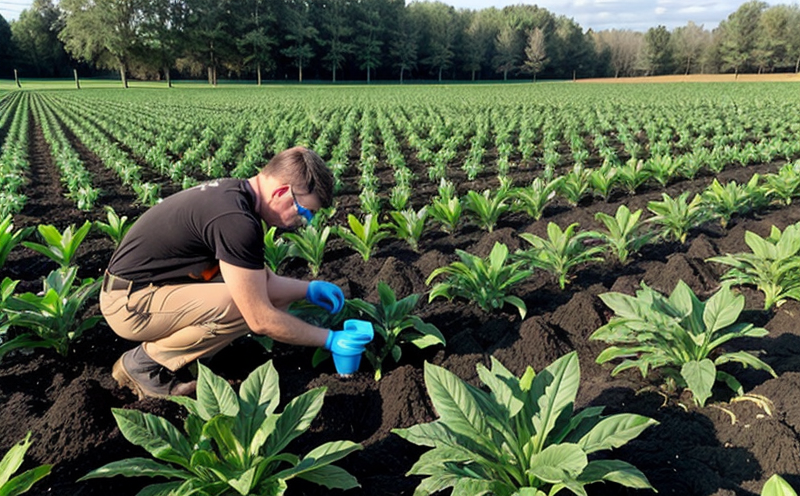Potassium (K₂O) Content Testing in Fertilizers
In the realm of agriculture and forestry testing, ensuring optimal fertilizer performance is paramount. Potassium content plays a crucial role in plant growth, enhancing crop yields, and improving stress tolerance. This service focuses on accurately determining the potassium oxide (K₂O) content within fertilizers to meet international standards and ensure product quality.
Testing potassium content involves several critical steps. Initially, samples are prepared by thoroughly mixing a representative quantity of the fertilizer. A precise amount is then weighed out for analysis. The chosen method for this testing typically adheres to ISO 13948:2015, which specifies procedures for determining K₂O in fertilizers. This standard ensures precision and accuracy.
During the analysis process, a digestion step may be required if the fertilizer contains organic components that could interfere with potassium measurement. Digestion is performed using nitric acid to break down these materials. After digestion, the solution undergoes filtration before being ready for spectrophotometric analysis or inductively coupled plasma optical emission spectroscopy (ICPOES), both of which are high-precision methods.
The results obtained from these analyses provide detailed insights into the potassium content, which is then reported as K₂O percentage by mass. This data is invaluable for quality managers looking to ensure consistent product performance and compliance with regulatory standards. Compliance officers benefit from this testing to avoid non-compliance issues, while R&D engineers can use it to optimize formulations.
From a broader perspective, accurate potassium content testing supports sustainable agricultural practices by ensuring that crops receive the right nutrients at optimal levels. Procurement teams also gain significant value as they can verify supplier claims and ensure cost-effectiveness in procurement decisions.
In summary, this service offers precise measurement of K₂O content using internationally recognized standards, providing actionable data to stakeholders within agriculture and forestry sectors. This ensures that fertilizers meet the highest quality benchmarks, supporting both environmental sustainability and agricultural productivity.
Scope and Methodology
The scope of this service includes the comprehensive determination of potassium oxide (K₂O) content in various types of fertilizers. The methodology strictly follows ISO 13948:2015, which specifies detailed procedures for this specific analysis.
For solid fertilizers such as granules or powders, a representative sample is taken and weighed accurately to the nearest milligram using an analytical balance. Liquid fertilizers are sampled from storage tanks, ensuring homogeneity by mixing thoroughly before taking the required volume. For both solid and liquid samples, digestion is performed using nitric acid at 170°C for one hour under reflux conditions.
The digested solutions undergo filtration through a 0.45 μm membrane filter to remove any undigested material or precipitates. The filtrate is then ready for analysis by either spectrophotometry or ICPOES, depending on the laboratory's equipment and preference. Spectrophotometric methods involve measuring absorbance at specific wavelengths corresponding to potassium ions.
ICPOES provides more precise results due to its ability to measure multiple elements simultaneously without interference from other compounds present in fertilizers. This method ensures that the reported K₂O content is accurate and reliable, meeting stringent quality control requirements.
The final step involves calibrating the instrument using potassium standards of known concentration and plotting a calibration curve. The absorbance or emission intensity measured against this curve allows for the calculation of K₂O percentage by mass in the fertilizer sample.
Why Choose This Test
Choosing potassium content testing is essential for maintaining high-quality fertilizers that meet international standards. This service ensures accurate measurement of K₂O, which directly impacts plant health and growth. By adhering to ISO 13948:2015, laboratories can provide reliable data that supports sustainable agricultural practices.
For quality managers, this test offers critical insights into product consistency, enabling them to make informed decisions about production processes. Compliance officers benefit from ensuring regulatory adherence, avoiding penalties and reputational damage associated with non-compliance. R&D engineers leverage these precise measurements to refine formulations, enhancing both efficacy and cost-effectiveness.
From a broader perspective, accurate potassium content testing supports environmental sustainability by optimizing nutrient use efficiency. This reduces waste and minimizes the risk of water pollution from excess nutrients leaching into water bodies. For procurement teams, this service ensures that they receive reliable data about supplier claims, facilitating better purchasing decisions.
The precision and reliability offered by this test contribute to long-term agricultural success. It helps in achieving higher crop yields while reducing input costs, ultimately benefiting both the environment and the economy. In summary, selecting potassium content testing is a strategic choice that aligns with global standards and supports sustainable practices.
Customer Impact and Satisfaction
The impact of accurate potassium (K₂O) content testing in fertilizers extends beyond laboratory results; it significantly influences the agricultural sector. Quality managers gain valuable insights into product consistency, enabling them to optimize production processes for better outcomes. Compliance officers benefit greatly from ensuring regulatory compliance, thus avoiding potential legal issues and maintaining a positive brand image.
R&D engineers can refine fertilizer formulations based on precise K₂O content data, leading to enhanced efficacy and cost savings. This not only improves crop yields but also supports environmental sustainability by minimizing nutrient runoff into water bodies. Procurement teams gain reliable information about supplier claims, allowing for more informed purchasing decisions.
Customers of this testing service experience increased trust in the integrity and quality of fertilizers supplied to them. This leads to higher customer satisfaction and loyalty. Additionally, sustainable agricultural practices supported by accurate K₂O content testing contribute to long-term environmental benefits. By choosing this comprehensive service, stakeholders can ensure that their products meet international standards, support sustainability efforts, and drive successful outcomes in agriculture.





